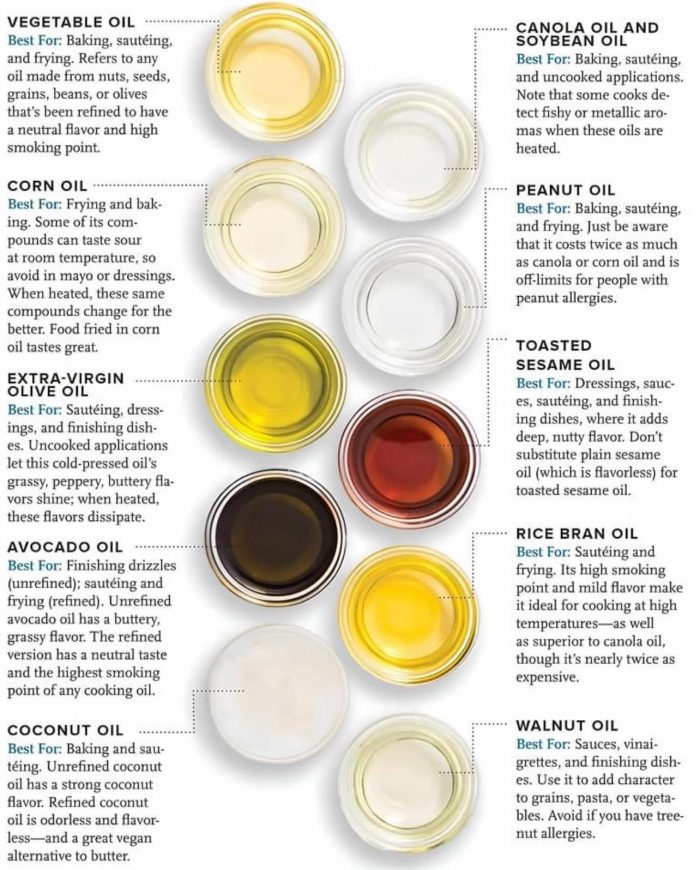
Cooking oils are one of the most important ingredients in the kitchen. They add flavor to your favorite dishes, but more importantly, they help cook food evenly so that it doesn’t burn or get soggy. In this article, I’ll go over 10 of the best cooking oils for different types of foods so you can choose the right one for whatever’s on your plate tonight!
1. Vegetable Oil
Vegetable oil is the most popular cooking oil in America. It’s made from soybean, corn or canola and has a high smoke point that makes it ideal for deep frying and baking. Vegetable oil is also used as an ingredient in many packaged food items such as crackers, chips and cereals. Because vegetable oil is often hydrogenated (a process where hydrogen is added to make the substance more solid), it may increase your risk of developing heart disease if you consume too much of it daily–especially when combined with other unhealthy fats like saturated animal fats or trans fats found in margarine spreads like butter substitutes made with partially hydrogenated cottonseed oils (i.e., those labeled “partially hydrogenated”).
2. Corn Oil
Corn oil is a high-quality fat that’s rich in monounsaturated fatty acids and omega-6 fatty acids. It also contains a good amount of vitamin E, which can help lower LDL cholesterol levels. Corn oil also has antioxidant properties, which can help protect us from free radicals that cause oxidative damage to our cells.
3. Extra-Virgin Olive Oil
Extra-virgin olive oil is best for salads, dressings and marinades. It can also be used to sauté vegetables or in place of butter or margarine when baking. Extra-virgin olive oil has a low smoke point (185 degrees Fahrenheit), so it should not be used for high-heat cooking methods such as frying or searing meats. Extra-virgin olive oil is considered to be one of the healthiest fats available because it contains monounsaturated fats which help lower LDL cholesterol levels without affecting HDL cholesterol levels like saturated fat does.
4. Avocado Oil
Avocado oil is a great choice for frying because it has a high smoke point and can withstand high heat without burning. It’s also good for baking, salad dressings and marinades, sautéing and stir-frying because of its mild flavor that doesn’t overpower the food you’re cooking. Avocado oil has a neutral taste that won’t alter your recipe too much if you’re using it as an ingredient in something like bread or muffins (though there are other oils with more subtle flavors). The biggest benefit of avocado oil is its heart-healthy qualities: It contains monounsaturated fats which have been shown to lower LDL (“bad”) cholesterol levels while raising HDL (“good”) cholesterol levels.
5. Coconut Oil
Coconut oil is a saturated fat, which means it’s high in lauric acid. This makes it solid at room temperature and an excellent choice for cooking or baking. It can also be used for frying because of its high smoke point (450 degrees Fahrenheit). If you’re looking for an oil that will give your food that delicious coconut flavor without being overpowering, this is the one!
6. Canola and Soybean Oil
Canola oil, like olive oil, is a monounsaturated fat. It’s also stable at high temperatures and doesn’t oxidize as quickly as other cooking oils. This makes it a great choice for frying or baking–and even deep-frying! Canola is also low in saturated fats and cholesterol-free (which means no trans fat). Canola has a light taste that won’t overpower your food; however it does have a distinctive flavor that some people don’t enjoy. If you’re looking for something milder-tasting than canola but still want an oil with high smoke point and stability under heat conditions, soybean oil might be for you!
7. Peanut Oil
Peanut oil is a great choice for frying and sauteing because of its high monounsaturated fat content, which means it’s more stable than other vegetable oils. It also has a high smoke point (450 degrees F), so you can use it to fry at high temperatures without getting any unpleasant flavors from the oil itself. Peanut oil contains vitamin E, which is an antioxidant that helps fight free radicals in your body and protect against chronic disease.
8. Toasted Sesame Oil
Toasted sesame oil is made from sesame seeds that are toasted before pressing. It has a strong flavor and aroma, so it’s not for everyone. But if you like Asian cooking, this is the oil for you! It can be used in stir fries, salad dressings and marinades.
9. Rice Bran Oil
Rice bran oil is extracted from the outer layer of rice kernels. It is a good source of vitamin E and minerals like magnesium and zinc. Rice bran oil also contains antioxidants, which help fight free radicals in your body. Rice bran oil has a mild flavor that works well with Asian dishes like stir-fries or sushi rolls. If you’re looking for something with less fatty acids than olive oil but still want some health benefits, then this cooking oil could be an option for you!
10. Walnut Oil
Walnut oil is a great choice for cooking because it’s rich in omega-3 fatty acids, which can lower your risk of heart disease and help with brain health. The oil has a distinctive flavor that makes it ideal for salad dressings and sauces–you’ll love how it enhances the taste of your favorite foods! However, walnut oil is expensive compared to other cooking oils like vegetable or olive oil. Because of this cost factor, we recommend using walnut oil sparingly as an ingredient rather than as your main cooking medium.
We hope we’ve helped you to discover some new cooking oils, as well as learn more about the ones that are already in your kitchen cupboards. If you’re looking for a good quality extra-virgin olive oil then check out our top 10 list above!
